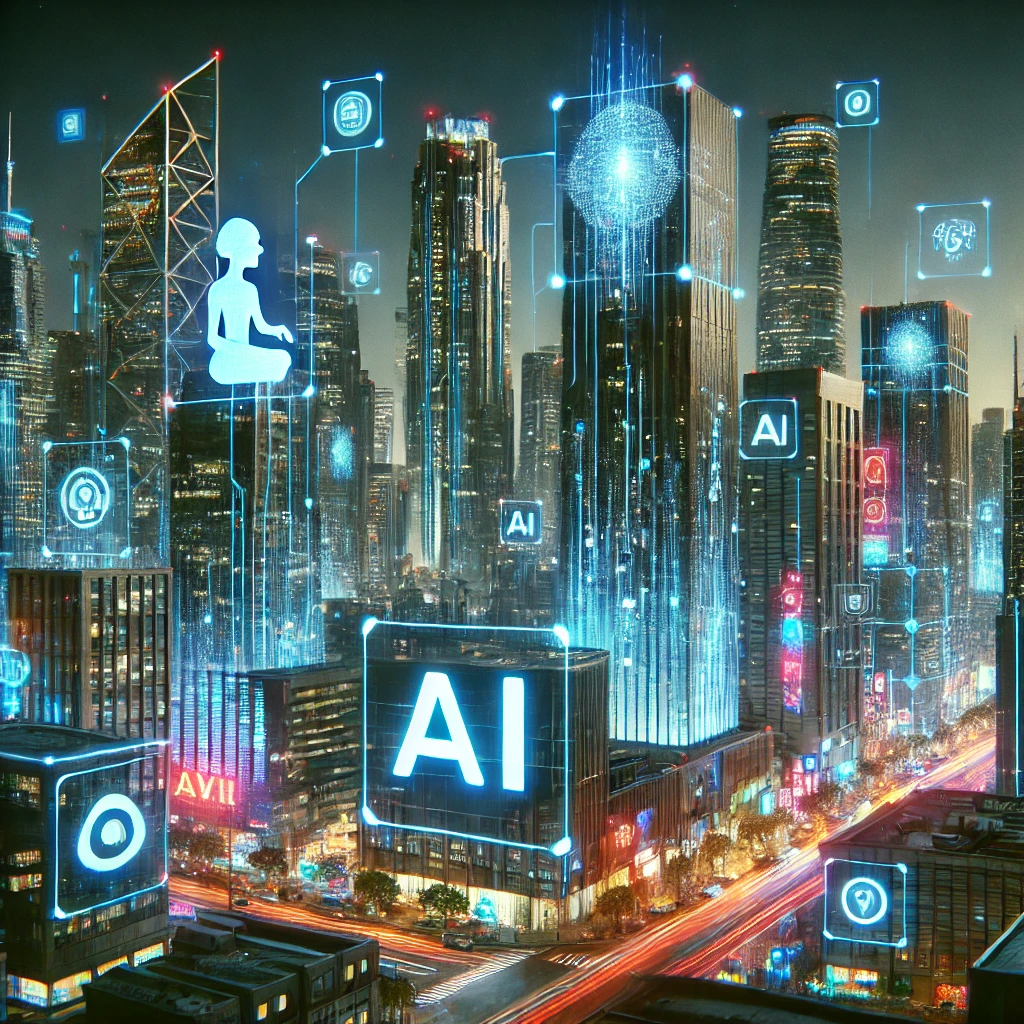Impact of AI on Job Markets
Navigating the Future: Understanding the Impact of AI on Global Job Markets
In the past decade, Artificial Intelligence (AI) has evolved from a futuristic concept into a daily tool that is reshaping how we live and work. This transformative technology is not just about robots and smart devices; its profound impact on the job market could be one of its most significant legacies. This blog post explores how AI is influencing job markets around the world, setting the stage for a future that intertwines human capabilities with machine efficiency.
The Emergence of AI in the Workplace
AI technology is infiltrating various sectors, from manufacturing and healthcare to finance and education. Its role in automating tasks, enhancing decision-making, and improving service delivery is undeniable. As AI continues to evolve, its integration into the workplace is leading to shifts in employment landscapes globally.
AI’s Broad Impact on Employment
The influence of AI on job markets is profound and multi-faceted. On one hand, it offers opportunities for efficiency and growth; on the other, it presents challenges such as job displacement. According to a report by the World Economic Forum, while AI is expected to displace 75 million jobs by 2022, it is also projected to create 133 million new ones, highlighting the dual impact of this technology.
Global Trends and Statistical Insights
Different regions are experiencing the impact of AI in unique ways. In Asia, AI is seen as a tool to enhance productivity and competitiveness. European markets focus on balancing AI innovations with worker protections. In North America, there is a significant push towards re-skilling workers to prepare for an AI-driven economy. Statistical data shows that industries such as telecommunications, manufacturing, and healthcare are leading in AI adoption, setting trends that are likely to spread globally.
The Flip Side of Technology: Industries Facing the Highest Risk of AI Job Displacement
While the rise of Artificial Intelligence (AI) heralds a new era of innovation and efficiency, it also brings significant challenges, notably the risk of job displacement. As AI technologies automate complex tasks, certain industries find themselves particularly vulnerable. This post explores which sectors are most at risk and offers insights into how workers can prepare and adapt.
Industries Most Affected by AI
- Manufacturing: Historically reliant on human labor for production lines, manufacturing is seeing a swift transition to robots and automated systems that can operate faster, longer, and more accurately than humans.
- Transportation and Logistics: Autonomous vehicles and drones are transforming how goods and people are moved. Drivers and logistics personnel may find their roles redefined as these technologies take over transportation responsibilities.
- Retail: With online shopping and automated checkouts powered by AI, traditional retail jobs are being restructured. Stock clerks and cashiers are particularly at risk as AI and robotics start to fill these roles.
- Customer Service: AI-driven chatbots and automated response systems are increasingly handling customer inquiries and support tasks, potentially displacing jobs in call centers and customer service departments.
The Human Cost of Technological Advancement
The transition towards AI-driven workplaces is not just a technological shift but a human one. The displacement of jobs due to AI introduces significant economic and social challenges. Workers in at-risk industries face job insecurity and the pressing need for re-skilling.
How Workers Can Adapt to AI Displacement
- Skill Development: Engaging in lifelong learning and acquiring new skills that are in demand in an AI-driven world is crucial.
- Career Transitioning: Exploring career paths in less vulnerable industries or roles that require distinctly human skills, such as creative and strategic thinking, can be a wise move.
- Advocacy and Support: Workers can also engage with unions and professional groups that may offer support and advocacy in navigating these transitions.
Embracing Change: The New Career Opportunities Emerging from AI Advancements
While the discourse around AI often focuses on job displacement, it’s equally important to highlight the new avenues it opens for employment. AI isn’t just taking jobs away; it’s also creating them, often in ways that we couldn’t have imagined a few decades ago. This blog explores the emerging job opportunities resulting from AI advancements and how you can position yourself to benefit from this shift.
Emerging Roles Driven by AI
- AI and Machine Learning Specialists: As businesses increasingly adopt AI technologies, the demand for experts in AI and machine learning has skyrocketed. These roles focus on developing and refining AI algorithms and systems.
- Data Analysts and Scientists: AI systems generate vast amounts of data that need to be analyzed and interpreted. Data scientists and analysts who can derive actionable insights from this data are in high demand.
- Robotics Engineers: The integration of AI into physical devices has led to a surge in demand for robotics engineers. These professionals design, build, and maintain robots that perform various tasks, from manufacturing to surgery.
- Ethical AI Advisors: As AI technology becomes more pervasive, the need for ethical guidelines and frameworks increases. Ethical AI advisors ensure that AI implementations adhere to ethical standards and societal norms.
- Customer Experience Managers: AI is also transforming the customer service industry by creating more personalized and efficient experiences. Professionals who can manage these AI-driven customer interactions are becoming crucial.
The Skills Needed for an AI-Driven Future
Building a career in an AI-enhanced job market requires a mix of technical skills and soft skills. Technical skills might include programming, machine learning, and data analytics, while essential soft skills include problem-solving, critical thinking, and adaptability. Continuous learning and upskilling are vital, as the field of AI is continuously evolving.
How to Prepare for AI-Driven Career Opportunities
- Educational Pursuits: Consider degrees or certifications in data science, AI, or robotics.
- Practical Experience: Look for internships or project opportunities that can provide hands-on experience with AI technologies.
- Networking: Engage with professional networks in the field of AI to learn from peers and discover opportunities.
Future-Proof Your Career: How to Adapt to an AI-Driven Work Environment
As AI continues to reshape industries, understanding how to adapt to an AI-driven work environment becomes crucial for career longevity. This post delves into strategies that can help you stay relevant and competitive in a workplace where AI plays a central role.
The Evolving Workplace
AI is not only changing the types of jobs available but also how we perform our current roles. Automation and AI tools are increasingly used for tasks ranging from data entry to complex decision-making processes, affecting nearly all career fields.
Key Strategies to Adapt to AI in the Workplace
- Enhance Your AI Literacy: Regardless of your profession, gaining a basic understanding of how AI works and its applications in your industry can make you more valuable to your employer and more adaptable to change.
- Develop Soft Skills: As AI takes over more routine tasks, soft skills like creativity, emotional intelligence, negotiation, and problem-solving become more critical. These are areas where humans still significantly outperform machines.
- Embrace Lifelong Learning: The pace of technological change necessitates a commitment to continuous learning. Engaging in ongoing education and training ensures that your skills remain current and in demand.
- Stay Flexible and Adaptable: Being open to change and ready to pivot your career path as new opportunities arise due to AI advancements is crucial for long-term career success.
- Advocate for Ethical AI Use: Understanding the ethical implications of AI and advocating for its responsible use in the workplace can position you as a leader in your field.
Leveraging AI for Your Career Advancement
- Utilize AI Tools: Familiarize yourself with AI tools that can enhance productivity in your current role. Whether it’s data analysis software, automated scheduling tools, or customer relationship management systems, understanding these tools can significantly increase your efficiency and value.
- Participate in AI Projects: Volunteering for projects involving AI at your workplace can provide valuable experience and visibility, showing your willingness to engage with emerging technologies.


